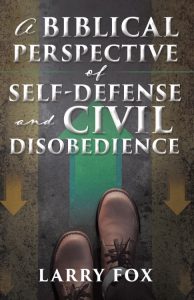A Biblical Perspective of Civil Disobedience
Reading time: 4 minutes

The following is an excerpt from a book by Larry Fox, A Biblical Perspective of Self-Defense and Civil Disobedience (Copyright © 2019).
Book Excerpt
Submission to Authority
One day as he was teaching, Jesus said something that sounded subversive. “The teachers of the law and the Pharisees sit in Moses’ seat. So you must obey them and do everything they tell you. But do not do what they do, for they do not practice what they preach” (Matt. 23:1 – 3). It would be easy to interpret this passage to mean Jesus’ followers must do whatever the religious leaders say, but that isn’t his point. He acknowledged the scribes and Pharisees sat in Moses’ seat, meaning it was their responsibility to interpret Scripture, including the law of Moses, so people must obey what they taught from Scripture. He charged the religious leaders of having a double standard because they personally didn’t do what they taught, so his followers shouldn’t copy their behavior. This may be the only statement he made about obeying the religious leaders, and he’s actually saying people should practice what the leaders teach from Scripture. He’s not proposing unconditional obedience to the religious leaders, because as we’ll see later, he clearly didn’t do that himself.
In Matthew 17:24 – 27, we see that Jesus and his disciples were exempt from the temple tax, but paid it “so that we may not offend” those who collected the tax. This is an important point: They were members of a spiritual kingdom and owed no loyalty to any earthly kingdom, but they submitted to avoid offending the lesser government. The same is true for us.
We see this again in Matthew 22:15 – 21. The Pharisees tried to trap Jesus with the issue of paying taxes to Caesar. His response was to give to Caesar what is Caesar’s and to God what is God’s. Caesar imposed taxes on regions under his control, so the people should pay the taxes.
Romans 13:1 – 7 is one of the passages most often used to make a case for unconditional submission to authorities, so we’ll consider it in detail. Paul wrote his letter to the believers in Rome during the early years of Nero’s rule, which were years of relative peace before persecution broke out.
This passage begins, “Everyone must submit himself to the governing authorities” (Rom. 13:1). The Greek word translated “submit” has a range of meanings. Based on the grammatical form used, this verse is a command to be subject to the governing authorities.
Paul continued, “there is no authority except that which God has established. The authorities that exist have been established by God. Consequently, he who rebels against the authority is rebelling against what God has instituted” (Rom. 13:1 – 2). God established all existing authorities, so submitting to them honors their divine commission to reward good and punish evil. This doesn’t mean our obedience must be unconditional, however. If an authority violates God’s laws or commands others to do so, it has violated its God-given commission and that action is illegitimate. Only God’s authority is absolute; all other authority is delegated and accountable to him. Jesus acknowledged this when interrogated by Pilate: “You would have no power over me if it were not given to you from above” (John 19:11). So obedience to a human authority is obedience to the authority God delegated. To rebel against legitimately exercised authority is to rebel against God.
Does this apply to abusive, tyrannical governments? To harmful or foolish laws? We must recognize human government’s authority ultimately lies in God’s hands. Nothing and no one is beyond God’s sovereign control.
Some argue there’s no scriptural precedent for opposing an existing law. However, the absence of a scriptural precedent may not prohibit legitimate opposition in today’s American system, for example. The Old Testament law set up a theocracy and God made the laws; there was no chance for humans to change those laws. In the New Testament, almost everywhere the believers went was territory occupied by Rome and there was no chance for changing those laws, either. Similarly, God’s laws govern all of us and clearly are beyond our influence. In America, we have a representative government and it’s our civil right to influence our representatives. So opposing or trying to change existing civil laws isn’t a problem for us. As long as a law is in effect, however….
(End of book excerpt)
